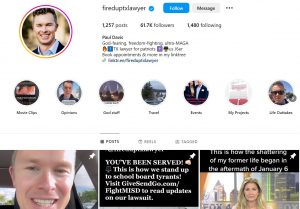Texan J6er’s Social Media Censorship Case Moved to California–Davis v. Facebook
Paul Davis is a lawyer and a self-described “J6er,” i.e., a participant in the January 6, 2021 U.S. Capitol insurrection. (His current Instagram bio: “God-fearing, freedom-fighting, ultra-MAGA🔥⬆️TX lawyer for patriots ✝️⚖️🇺🇸 J6er”). His legacy Facebook and Instagram accounts got suspended because he posted videos about January 6.

[FN: That was presumably the number when the complaint was filed. Today, his Instagram account has over 4x this number of followers. Being shadowbanned has really suppressed his exposure.]
The Texas social media censorship law remains temporarily enjoined by the Fifth Circuit pending Supreme Court review, but Davis couldn’t wait. Invoking the law, he sought an injunction to restore his deactivated accounts, remove all account restrictions, and get his (self-represented) attorneys’ fees.
This ruling primarily deals with venue. The court summarizes: the “Meta Forum-Selection Clause is mandatory, valid, and enforceable.”
Validity. “Davis does not dispute that, by creating and using his Facebook and Instagram accounts, he voluntarily bound himself to Meta’s terms of service. Nor does he does point to any other issues that would call into question the Meta Forum-Selection Clause’s validity.”
Clause Scope. The TOS’s “broad ‘arises out of or relates to’ language applies to Davis’s Chapter 143A claims, which relate directly to Meta’s terms of service and to Davis’s ability to use Meta’s products without restriction.”
Enforceability. Davis resisted the venue transfer because California has a “left-leaning jury pool and judiciary.” The judge doesn’t respond well to this standard #MAGA talking point:
Davis’s argument against transfer centers on his plainly partisan speculation that he will receive a less favorable outcome if this case proceeds before a judge appointed by a president with viewpoints that differ from his own. The Court finds this argument unpersuasive and demeaning to the notions of independence and faithfulness to the law that have underpinned the federal judiciary since this nation’s founding…
Davis’s argument inappropriately conflates the competence and integrity of a federal judge with the political party of the president that appointed them. In so doing, Davis ignores the fact that every federal judge takes the same solemn oath to “faithfully and impartially discharge and perform all the duties incumbent [upon] them” under the Constitution and the laws of the United States.
Davis claimed that Texas’ social media censorship law preempted the TOS venue clause. While it expressly preempts purported waivers of the law, that provision didn’t mention venue selection clauses. Texas has since “fixed” this hole by amending the law (reminder: it’s still enjoined) to require suits to be heard by Texas courts starting Sept. 1, 2023. More evidence that the Texas legislature prioritizes its agenda wisely.
Davis argued that the TOSes are contracts of adhesion. This is true, but that doesn’t render them automatically unenforceable. Indeed,
As a practicing attorney, Davis is more sophisticated than many of the individual consumers against whom forum-selection clauses are regularly enforced. For this reason, Davis can hardly claim that the Meta Forum-Selection Clause is unduly surprising or oppressive. Nor can Davis point to a single instance of a court finding the Meta Forum-Selection Clause invalid as a product of a contract of adhesion. On the contrary, courts around the country have uniformly upheld Meta’s forum-selection clauses.
I wouldn’t be surprised to see Davis’ future marketing claim that a federal judge has praised him as “sophisticated” LOL.
In the end, the court orders the case transferred to the Northern District of California per the Facebook/Instagram TOSes. I assume that court will dismiss the lawsuit because the law remains enjoined.
* * *
To be clear, #MAGA conversations are always welcome at Truth Social or its competitors; but #MAGA enthusiasts prefer to speak at places where they irritate everyone else and thus aren’t wanted. These disruptions aren’t in the community’s best interest. We’ve seen how the Musk-facilitated #MAGA takeover of Twitter–something the social media censorship law will compel for other regulated services–has driven users and advertisers away, jeopardizing Twitter’s survival. Replicate those exoduses across all of the entities regulated by the Texas social media censorship law, and the entire Internet industry would profoundly reconfigure.
Thus, it should be clear why the Supreme Court’s assessment of the constitutionality of the social media censorship laws will be one of the defining court rulings of the Internet era. Simply put, the Internet has a future only if the Supreme Court strikes down the Texas and Florida laws. Say a prayer for it. 🙏🙏🙏
Case citation: Davis v. Meta Platforms, Inc., 2023 WL 4670491 (E.D. Tex. July 20, 2023)
BONUS: A different plaintiff sued Facebook for breach of contract in New Jersey for removing its content without notifying it. The court easily transfers this case to the Northern District of California per Facebook’s TOS. UnbeatableSale.com, Inc. v. Meta Platforms, Inc., 2023 WL 4764813 (D.N.J. July 26, 2023).